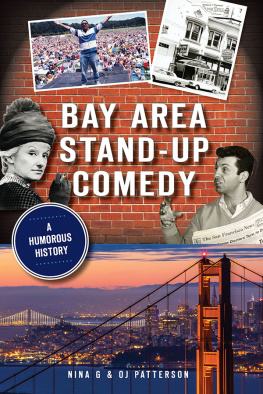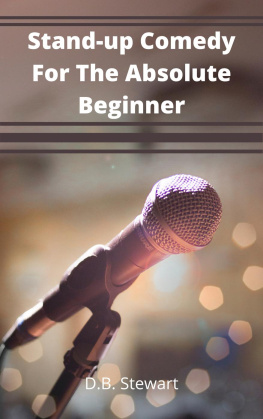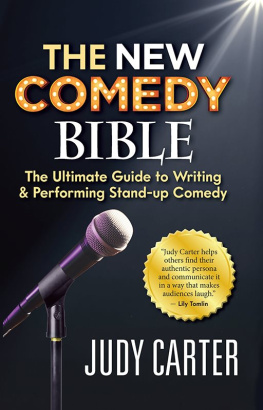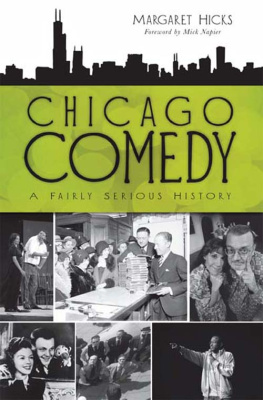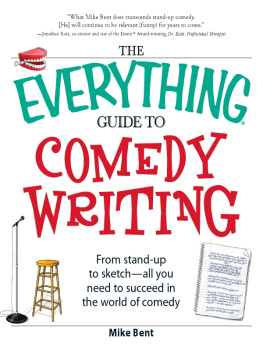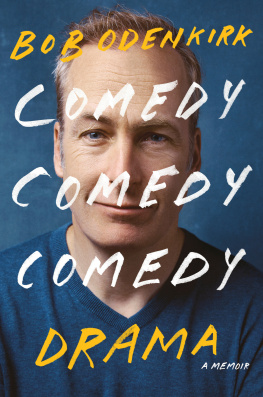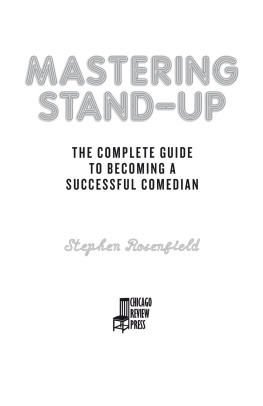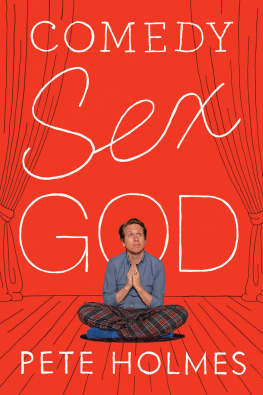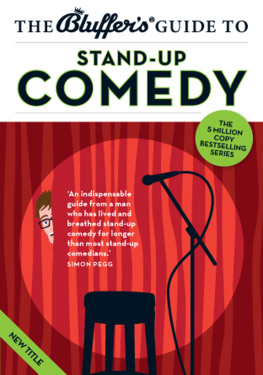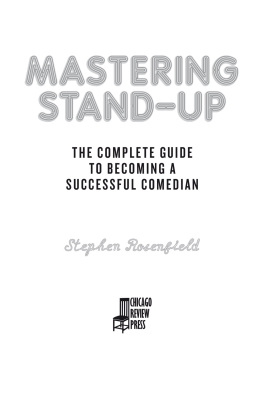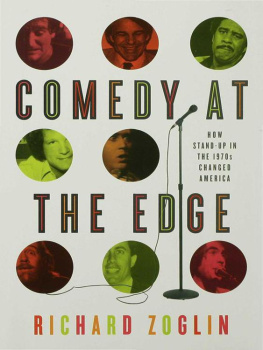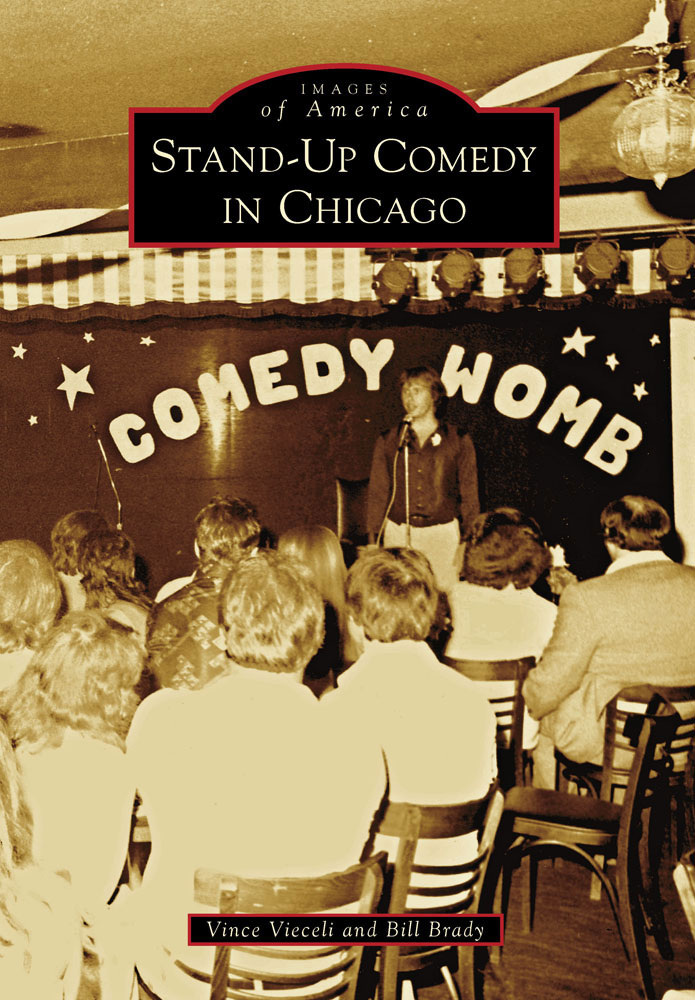
IMAGES
of America
STAND-UP COMEDY
IN CHICAGO
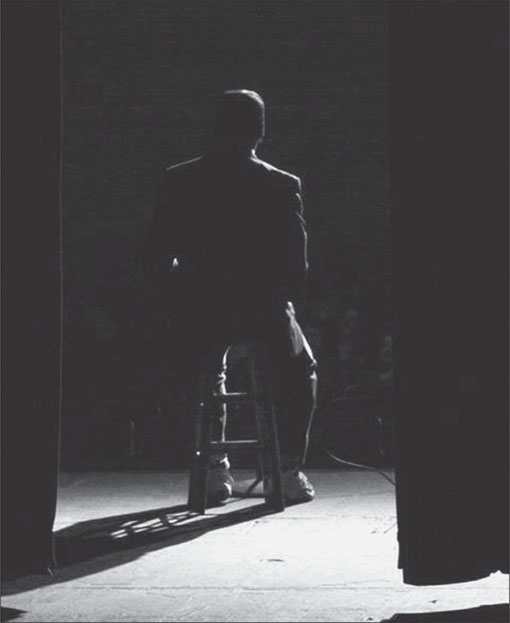
Comedian James Wesley Jackson performs at the Gorton Community Center in Lake Forest, Illinois, in April 2010. (Courtesy of and photograph by Jimmy McHugh.)
ON THE COVER: Brian Schmidt performs at the Comedy Womb in the mid-1970s. (Courtesy of Chrissie Frey.)
IMAGES
of America
STAND-UP COMEDY
IN CHICAGO
Vince Vieceli and Bill Brady

Copyright 2014 by Vince Vieceli and Bill Brady
ISBN 978-1-4671-1184-3
Ebook ISBN 9781439642719
Published by Arcadia Publishing
Charleston, South Carolina
Library of Congress Control Number: 2013951874
For all general information, please contact Arcadia Publishing:
Telephone 843-853-2070
Fax 843-853-0044
E-mail
For customer service and orders:
Toll-Free 1-888-313-2665
Visit us on the Internet at www.arcadiapublishing.com
This book is dedicated to every Chicago stand-up comedian who has ever had the courage to take the stage and tried to make strangers laugh, to every club owner and booker who has made a stage available to us, and to every Chicagoan, near and far, who has ever come to support us. Dying is easy; comedy is hard.
CONTENTS
ACKNOWLEDGMENTS
While we are incredibly grateful to every person or comedy club that provided photographs or assistance with this book, there are some whose contributions we must recognize.
Thank you to Kelsey Jones, Maggie Bullwinkel, and Arcadia Publishing for believing in the worthiness of this project as much as we did, and a heartfelt thanks goes to Eileen Barrett, Bette Brady, Sean Brady, and Megan Brady for their patience and understanding.
Special thanks to William Cramp for having the wisdom to understand you were capturing history, and the William Cramp Estateespecially Dr. Andrew Moorman and Pat Nowackfor sharing his work. A huge thank you goes to Gina Vieceli-Garza, Mike Ostrowski, Bob Rumba, and Jenna Dalgety, whose assistance we could not have done without.
Thanks goes to the following people, groups, and organizations for the hands, large and small, that they had in this project: Martin Bailon, Tina Beard, Lisa Bonnice, Bert Borth, Kay Cammon, Karen Conti, Tom Dreesen, Duck Logic, Sally Edwards, Chrissie Frey, Paul Frisbie, Bill Gorgo, Dave Grier, Monica Grier, Bert Haas, Ted Holum, Frank Hooper, Allan Johnson, Raymond Lambert, Pat McGann, Jimmy McHugh, Denise Mix, Ginger Frey Nicolaou, Jimmy Pardo, Marlene Patterson, Mike Preston, Pete Schwaba, Tom Senese, Mark Shufeldt, Mike Thomas, Ernie Tucker, Patti Vasquez, John Vieceli, Brad Wethern, Tracey Whitmer, Zanies Comedy Club, and the Harold Washington Library Center.
INTRODUCTION
While the bulk of these pages primarily focus on the years between 1970 and 1990, it would be incredibly disrespectful to ignore those who came before that period. After all, how can one write about stand-up comedy in Chicago without mentioning Jack Benny or Bob Newhart? Equal attention must be paid to comedians like George Carlin and Dick Gregory, whose tenure in Chicago considerably altered their careers. Overall, the whos who and whats what of Chicago stand-up comedy is such that the show biz cliche without further introduction must be disregarded as we provide a worthy primer on the subject.
In the early 20th century, there were primarily two sources of live comedy in Chicago. The first were plays staged at venues such as McVickers Theater and Hooleys Parlor Home of Comedy. Eddie Foy Sr., one of the first superstars of American comedy, was so respected that prior to an engagement in Chicago, those putting on his show honored his request to forgo a hotel and be put up in a furnished Lake Shore Drive home. Throughout the 1910s, Foy toured with his children as Eddie Foy Sr. and the Seven Little Foys, a family vaudeville act. Foy is also remembered for his onstage attempts to calm Chicagoans during the deadly Iroquois Theater fire in 1903.
Chicagoans also got their live comedy via vaudeville shows, which contain the deepest roots of stand-up comedy. Taking the stage to the playing of Fine and Dandy, comedy teams and monologists were audience favorites, although not all comedians began their careers that way. Waukegan native Jack Benny debuted as a serious violinist and was talented enough for Minnie Marx to suggest that he join the Marx Brothers as one of their touring musicians when Benny was still a teenager. It was not until the enlisted Benny was stationed at Naval Station Great Lakes during World War I that his comedic gift emerged.
Like Benny, Bob Hope and Edgar Bergen also debuted in vaudeville before adapting to new mediums. Raised in Cleveland, Hope entered vaudeville as half of a comedy song-and-dance duo before going solo and being selected to emcee vaudeville shows at Chicagos Stratford Theater. The Stratford engagement was originally for two weeks, but as Hope became a cant-miss funny man, he was retained for an additional six months.
Bergen doubled down on his career in the 1920s, commissioning Chicago carpenter Theodore Mack to create wisecracking dummy Charlie McCarthy, whose head alone cost the 16-year-old Bergen $35. His first performance was at the Waveland Avenue Congregational Church in Chicago, and soon after that, Bergen and McCarthy began to appear in vaudeville shows and short films. A recommendation from Nol Coward helped Bergen secure a guest appearance on Rudy Vallees radio show, which led to a starring role on The Chase and Sanborn Hour. There, Bergen introduced a second dummy, Mortimer Snerd. Bergen was a fixture on the radio from 1937 until 1956.
The vaudevillian comedy team of Carroll and Isabelle Allen, parents of late-night television pioneer Steve Allen, are remembered less often. Sadly, Carroll died when Steve was 18 months old, after which Isabelle continued to perform under the name Belle Montrose and earned Milton Berles praise as the funniest woman in vaudeville. Young Steve applied what he had gathered from watching his mothers shows to become the class clown at several Chicago schools, including Hyde Park High School and St. Joseph Military Academy, a boarding school in nearby La Grange Park. A health issue prompted Allens move to Arizona, where he entered radio and created a character named Claude Horribly that, years later, Allen said was more or less an imitation of Bergens Mortimer Snerd.
In addition to performing at vaudeville theaters, comedians also got stage time at speakeasies, including an Al Capone joint where a lit cigarette flung in Chicago native Morey Amsterdams direction convinced him that Hollywood would be safer. The move paid off for Amsterdam, who starred on The Morey Amsterdam Show in the late 1940s before landing the role of Buddy Sorrell on The Dick Van Dyke Show.
Unlike Amsterdam, comedian Joe E. Lewis did not exit Chicago unscathed, and his 1927 engagement at the Green Mill later inspired the film The Joker is Wild, starring Frank Sinatra. Perhaps Milton Berle fared best. Berle confessed that once, between shows at the Oriental Theatre, the mob sped him to Cicero, where he performed for Capone and others at the Cotton Club.
In the 1950s, Chicago saw the emergence of four local talents who, despite their contributions, are often overlooked in the story of the areas comedy history.
Joe Contis show business career began in 1936 when, at the age of 12, he tap-danced his way to first place in the Major Bowes
Next page

